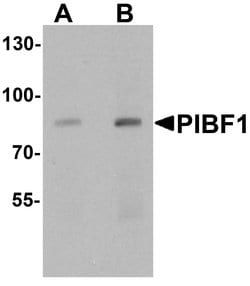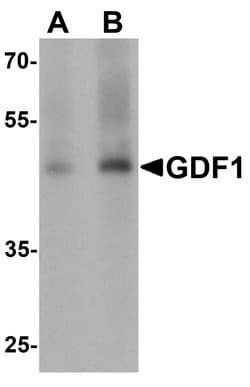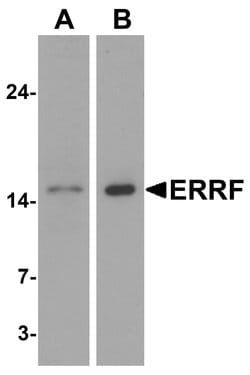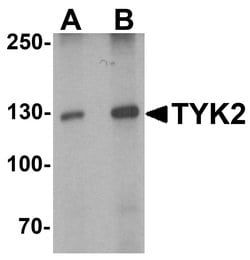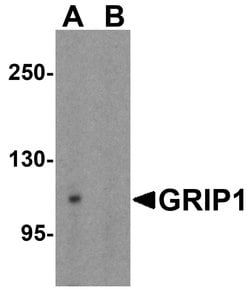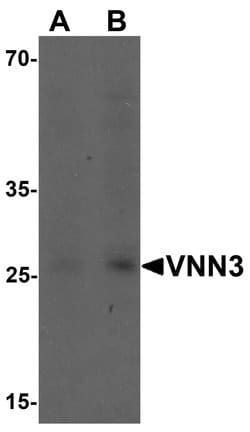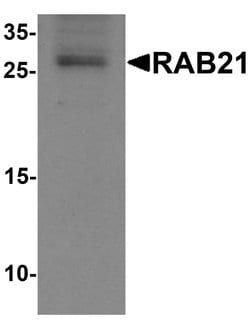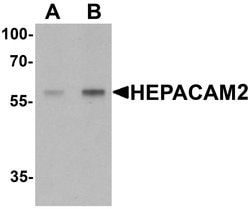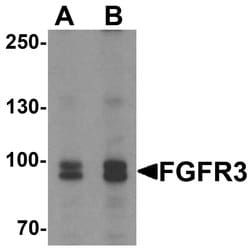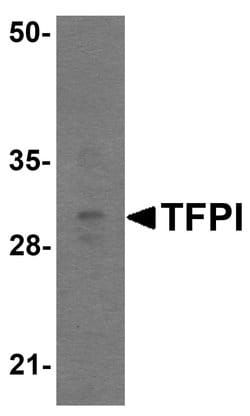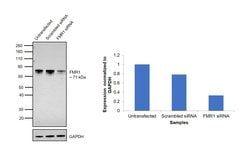PIPA534574
FGFR3 Polyclonal Antibody, Invitrogen™
Manufacturer: Thermo Scientific
Select a Size
| Pack Size | SKU | Availability | Price |
|---|---|---|---|
| Each of 1 | PIPA534574-Each-of-1 | In Stock | ₹ 49,350.50 |
PIPA534574 - Each of 1
In Stock
Quantity
1
Base Price: ₹ 49,350.50
GST (18%): ₹ 8,883.09
Total Price: ₹ 58,233.59
Antigen
FGFR3
Classification
Polyclonal
Conjugate
Unconjugated
Gene
FGFR3
Gene Alias
ACH; CD333; CEK2; FGFR3; FGFR-3; FGFR3deltaTM; Fibroblast growth factor receptor 3; fibroblast growth factor receptor 3 variant 4; Flg-2; FR3; HBGFR; heparin-binding growth factor receptor; HSFGFR3EX; hydroxyaryl-protein kinase; JTK4; Mfr3; sam3; tyrosine kinase JTK4
Host Species
Rabbit
Purification Method
Antigen affinity chromatography
Regulatory Status
RUO
Gene ID (Entrez)
14184, 2261, 84489
Content And Storage
4° C
Form
Liquid
Applications
Immunohistochemistry, Western Blot
Concentration
1 mg/mL
Formulation
PBS with 0.02% sodium azide
Gene Accession No.
P22607, Q61851
Gene Symbols
FGFR3
Immunogen
A 19 amino acid peptide near the carboxy terminus of human FGFR3
Quantity
100 μg
Primary or Secondary
Primary
Target Species
Human, Mouse, Rat
Product Type
Antibody
Isotype
IgG
Description
- A suggested positive control is SK-N-SH cell lysate
- PA5-34574 can be used with blocking peptide PEP-1617
- FGFR3 is a member of the FGFR family of receptor tyrosine kinases
- This family is known to regulate a host of cellular functions including angiogenesis, mitogenesis, osteogenesis, myogenesis, carcinogenesis, cellular differentiation, and tissue repair after injury
- The FGFR family has also been implicated in a number of diseases including cancer, rheumatoid arthritis, and diabetic retinopathy
- FGFR family members differ from one another in their ligand affinities and tissue distribution
- A full-length representative protein would consist of an extracellular region, composed of three immunoglobulin-like domains, a single hydrophobic membrane-spanning segment and a cytoplasmic tyrosine kinase domain
- The extracellular portion of the protein interacts with fibroblast growth factors, setting in motion a cascade of downstream signals, μgtimately influencing mitogenesis and differentiation
- This particular family member binds acidic and basic fibroblast growth hormone and plays a role in bone development and maintenance
- Mutations in this gene lead to craniosynostosis and multiple types of skeletal dysplasia
- Three alternatively spliced transcript variants that encode different protein isoforms have been described.
Compare Similar Items
Show Difference
Antigen: FGFR3
Classification: Polyclonal
Conjugate: Unconjugated
Gene: FGFR3
Gene Alias: ACH; CD333; CEK2; FGFR3; FGFR-3; FGFR3deltaTM; Fibroblast growth factor receptor 3; fibroblast growth factor receptor 3 variant 4; Flg-2; FR3; HBGFR; heparin-binding growth factor receptor; HSFGFR3EX; hydroxyaryl-protein kinase; JTK4; Mfr3; sam3; tyrosine kinase JTK4
Host Species: Rabbit
Purification Method: Antigen affinity chromatography
Regulatory Status: RUO
Gene ID (Entrez): 14184, 2261, 84489
Content And Storage: 4° C
Form: Liquid
Applications: Immunohistochemistry, Western Blot
Concentration: 1 mg/mL
Formulation: PBS with 0.02% sodium azide
Gene Accession No.: P22607, Q61851
Gene Symbols: FGFR3
Immunogen: A 19 amino acid peptide near the carboxy terminus of human FGFR3
Quantity: 100 μg
Primary or Secondary: Primary
Target Species: Human, Mouse, Rat
Product Type: Antibody
Isotype: IgG
Antigen:
FGFR3
Classification:
Polyclonal
Conjugate:
Unconjugated
Gene:
FGFR3
Gene Alias:
ACH; CD333; CEK2; FGFR3; FGFR-3; FGFR3deltaTM; Fibroblast growth factor receptor 3; fibroblast growth factor receptor 3 variant 4; Flg-2; FR3; HBGFR; heparin-binding growth factor receptor; HSFGFR3EX; hydroxyaryl-protein kinase; JTK4; Mfr3; sam3; tyrosine kinase JTK4
Host Species:
Rabbit
Purification Method:
Antigen affinity chromatography
Regulatory Status:
RUO
Gene ID (Entrez):
14184, 2261, 84489
Content And Storage:
4° C
Form:
Liquid
Applications:
Immunohistochemistry, Western Blot
Concentration:
1 mg/mL
Formulation:
PBS with 0.02% sodium azide
Gene Accession No.:
P22607, Q61851
Gene Symbols:
FGFR3
Immunogen:
A 19 amino acid peptide near the carboxy terminus of human FGFR3
Quantity:
100 μg
Primary or Secondary:
Primary
Target Species:
Human, Mouse, Rat
Product Type:
Antibody
Isotype:
IgG
Antigen: TFPI
Classification: Polyclonal
Conjugate: Unconjugated
Gene: TFPI
Gene Alias: A630013F22Rik; anti-convertin; AW552122; EPI; Extrinsic pathway inhibitor; LACI; Lipoprotein-associated coagulation inhibitor; OTTHUMP00000163472; OTTHUMP00000205431; TFI; TFPI; TFPI1; Tissue factor pathway inhibitor; tissue factor pathway inhibitor (lipoprotein-associated coagulation inhibitor)
Host Species: Rabbit
Purification Method: Antigen affinity chromatography
Regulatory Status: RUO
Gene ID (Entrez): 21788, 29436, 7035
Content And Storage: Maintain refrigerated at 2-8°C for up to 3 months. For long term storage store at -20°C
Form: Liquid
Applications: Immunohistochemistry, Western Blot
Concentration: 1 mg/mL
Formulation: PBS with 0.02% sodium azide
Gene Accession No.: O54819, P10646, Q02445
Gene Symbols: TFPI
Immunogen: A 13 amino acid peptide near the amino terminus of human TFPI
Quantity: 100 μg
Primary or Secondary: Primary
Target Species: Human, Mouse, Rat
Product Type: Antibody
Isotype: IgG
Antigen:
TFPI
Classification:
Polyclonal
Conjugate:
Unconjugated
Gene:
TFPI
Gene Alias:
A630013F22Rik; anti-convertin; AW552122; EPI; Extrinsic pathway inhibitor; LACI; Lipoprotein-associated coagulation inhibitor; OTTHUMP00000163472; OTTHUMP00000205431; TFI; TFPI; TFPI1; Tissue factor pathway inhibitor; tissue factor pathway inhibitor (lipoprotein-associated coagulation inhibitor)
Host Species:
Rabbit
Purification Method:
Antigen affinity chromatography
Regulatory Status:
RUO
Gene ID (Entrez):
21788, 29436, 7035
Content And Storage:
Maintain refrigerated at 2-8°C for up to 3 months. For long term storage store at -20°C
Form:
Liquid
Applications:
Immunohistochemistry, Western Blot
Concentration:
1 mg/mL
Formulation:
PBS with 0.02% sodium azide
Gene Accession No.:
O54819, P10646, Q02445
Gene Symbols:
TFPI
Immunogen:
A 13 amino acid peptide near the amino terminus of human TFPI
Quantity:
100 μg
Primary or Secondary:
Primary
Target Species:
Human, Mouse, Rat
Product Type:
Antibody
Isotype:
IgG
Antigen: TBR1
Classification: Polyclonal
Conjugate: Unconjugated
Gene: TBR1
Gene Alias: LOW QUALITY PROTEIN: T-box brain protein 1; T-box brain gene 1; T-box brain protein 1; T-box brain transcription factor 1; T-box, brain 1; T-box, brain, 1; T-box, brain, 1-like; TBR1; TBR-1; T-brain-1; TES-56
Host Species: Rabbit
Purification Method: Antigen affinity chromatography
Regulatory Status: RUO
Gene ID (Entrez): 10716, 21375, 680427
Content And Storage: Store at 4°C short term. For long term storage, store at -20°C, avoiding freeze/thaw cycles.
Form: Liquid
Applications: Immunohistochemistry (Paraffin), Western Blot
Concentration: 1.0 mg/mL
Formulation: PBS with 0.02% sodium azide; pH 7.4
Gene Accession No.: Q16650, Q64336
Gene Symbols: TBR1
Immunogen: Synthetic peptide conjugated to KLH derived from within residues 50 - 150 of Mouse TBR1.
Quantity: 100 μg
Primary or Secondary: Primary
Target Species: Human, Mouse, Rat
Product Type: Antibody
Isotype: IgG
Antigen:
TBR1
Classification:
Polyclonal
Conjugate:
Unconjugated
Gene:
TBR1
Gene Alias:
LOW QUALITY PROTEIN: T-box brain protein 1; T-box brain gene 1; T-box brain protein 1; T-box brain transcription factor 1; T-box, brain 1; T-box, brain, 1; T-box, brain, 1-like; TBR1; TBR-1; T-brain-1; TES-56
Host Species:
Rabbit
Purification Method:
Antigen affinity chromatography
Regulatory Status:
RUO
Gene ID (Entrez):
10716, 21375, 680427
Content And Storage:
Store at 4°C short term. For long term storage, store at -20°C, avoiding freeze/thaw cycles.
Form:
Liquid
Applications:
Immunohistochemistry (Paraffin), Western Blot
Concentration:
1.0 mg/mL
Formulation:
PBS with 0.02% sodium azide; pH 7.4
Gene Accession No.:
Q16650, Q64336
Gene Symbols:
TBR1
Immunogen:
Synthetic peptide conjugated to KLH derived from within residues 50 - 150 of Mouse TBR1.
Quantity:
100 μg
Primary or Secondary:
Primary
Target Species:
Human, Mouse, Rat
Product Type:
Antibody
Isotype:
IgG
Antigen: FMRP
Classification: Polyclonal
Conjugate: Unconjugated
Gene: FMR1
Gene Alias: AT24755; BcDNA:GM08679; cg 6203 gene product from transcript cg6203-rc; cg6203; CG6203-PA; CG6203-PB; CG6203-PC; CG6203-PD; CG6203-PE; CG6203-PF; CG6203-PG; CG6203-PH; CG6203-PI; CG6203-PJ; CG6203-PK; dFMR; DFmr1; dFmrp; dfxr; dfxr1; dFXRP; Dmel\CG6203; Dmel_CG6203; dmfr1; drosophila fragile X mental retardation protein; EP(3)3517; FMR; FMR1; Fmr-1; Fmr1-PA; Fmr1-PB; Fmr1-PC; Fmr1-PD; Fmr1-PE; Fmr1-PF; Fmr1-PG; Fmr1-PH; Fmr1-PI; Fmr1-PJ; Fmr1-PK; FMRP; FMRP translational regulator 1; fragile X; fragile X mental retardation; fragile X mental retardation 1; fragile X mental retardation gene; fragile X mental retardation protein; fragile X mental retardation protein 1; Fragile X mental retardation protein 1 homolog; fragile X mental retardation related 1; fragile X mental retardation syndrome 1; fragile X mental retardation syndrome 1 homolog; Fragile X mental retardation syndrome-related protein 1; fragile X mental retardation-1 protein; fragile X protein; fragile x related; fragile X related protein; fragile X retardation 1 protein; fragile X-related; fragile-X; Fragile-X mental retardation 1; Fragile-X mental retardation protein; Fragile-X-related; FRAXA; FXR; MGC87458; POF; POF1; protein FMR-1; ragile X mental retardation protein; synaptic functional regulator FMR1
Host Species: Rabbit
Purification Method: Antigen affinity chromatography
Regulatory Status: RUO
Gene ID (Entrez): 14265, 2332, 24948
Content And Storage: Store at 4°C short term. For long term storage, store at -20°C, avoiding freeze/thaw cycles.
Form: Liquid
Applications: Immunocytochemistry, Immunohistochemistry (Paraffin), Immunoprecipitation, Western Blot
Concentration: 1 mg/mL
Formulation: PBS with 0.02% sodium azide; pH 7.4
Gene Accession No.: P35922, Q06787, Q80WE1
Gene Symbols: FMR1
Immunogen: Synthetic peptide conjugated to KLH derived from within residues 550 to the C-terminus of Human FMRP.
Quantity: 100 μg
Primary or Secondary: Primary
Target Species: Human, Mouse, Rat
Product Type: Antibody
Isotype: IgG
Antigen:
FMRP
Classification:
Polyclonal
Conjugate:
Unconjugated
Gene:
FMR1
Gene Alias:
AT24755; BcDNA:GM08679; cg 6203 gene product from transcript cg6203-rc; cg6203; CG6203-PA; CG6203-PB; CG6203-PC; CG6203-PD; CG6203-PE; CG6203-PF; CG6203-PG; CG6203-PH; CG6203-PI; CG6203-PJ; CG6203-PK; dFMR; DFmr1; dFmrp; dfxr; dfxr1; dFXRP; Dmel\CG6203; Dmel_CG6203; dmfr1; drosophila fragile X mental retardation protein; EP(3)3517; FMR; FMR1; Fmr-1; Fmr1-PA; Fmr1-PB; Fmr1-PC; Fmr1-PD; Fmr1-PE; Fmr1-PF; Fmr1-PG; Fmr1-PH; Fmr1-PI; Fmr1-PJ; Fmr1-PK; FMRP; FMRP translational regulator 1; fragile X; fragile X mental retardation; fragile X mental retardation 1; fragile X mental retardation gene; fragile X mental retardation protein; fragile X mental retardation protein 1; Fragile X mental retardation protein 1 homolog; fragile X mental retardation related 1; fragile X mental retardation syndrome 1; fragile X mental retardation syndrome 1 homolog; Fragile X mental retardation syndrome-related protein 1; fragile X mental retardation-1 protein; fragile X protein; fragile x related; fragile X related protein; fragile X retardation 1 protein; fragile X-related; fragile-X; Fragile-X mental retardation 1; Fragile-X mental retardation protein; Fragile-X-related; FRAXA; FXR; MGC87458; POF; POF1; protein FMR-1; ragile X mental retardation protein; synaptic functional regulator FMR1
Host Species:
Rabbit
Purification Method:
Antigen affinity chromatography
Regulatory Status:
RUO
Gene ID (Entrez):
14265, 2332, 24948
Content And Storage:
Store at 4°C short term. For long term storage, store at -20°C, avoiding freeze/thaw cycles.
Form:
Liquid
Applications:
Immunocytochemistry, Immunohistochemistry (Paraffin), Immunoprecipitation, Western Blot
Concentration:
1 mg/mL
Formulation:
PBS with 0.02% sodium azide; pH 7.4
Gene Accession No.:
P35922, Q06787, Q80WE1
Gene Symbols:
FMR1
Immunogen:
Synthetic peptide conjugated to KLH derived from within residues 550 to the C-terminus of Human FMRP.
Quantity:
100 μg
Primary or Secondary:
Primary
Target Species:
Human, Mouse, Rat
Product Type:
Antibody
Isotype:
IgG
